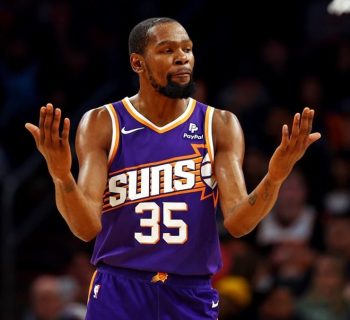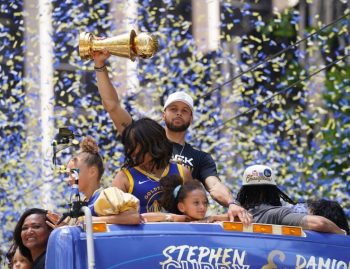NBA
NBA AM: Will They Keep The Restricted Free Agents?

The Future Restricted: NBA teams have a window that opens in July and runs through the end of October to reach contract extensions with their rookie scale players entering their fourth season. For the most part, a small handful of deals get done every year and this year was no exception. Cleveland’s Kyrie Irving was the first to ink a deal, and several others followed.
There were, however, three players in very different situations that tried to reach a deal and ultimately did not, making them free agents in July. All three players are likely to receive the necessary qualifying offer sheets to make them restricted free agents. Here is where things stand today:
Jimmy Butler, Chicago Bulls, $3.013 Million Qualifying Offer
The Bulls and Butler negotiated off and on all summer, ultimately arriving at an 11th hour offer in the $11 million range per season on a four-year deal. The contract talks were cordial and respectful; both sides genuinely tried to make a deal. Ultimately, Butler saw that the Bulls’ valuation was based more on his performance last year than what his potential going forward could be. Between having confidence in himself and what others in the marketplace started to receive in contracts, Butler decided to leave some $44 million in guaranteed money on the table and bet on himself.
So far, with his play this season, that bet is looking pretty good.
Butler is averaging 21.7 points, 5.6 rebounds and 3.4 assists on 48.8 percent shooting from the field and 30.8 percent shooting from three-point range.
So what does that mean for the Bulls going forward?
Both sides still very much want to continue the relationship, so there is not a sense that Butler is going to try and find a deal Chicago won’t match. However, not reaching a deal does motivate Butler’s representation to find a significant offer.
While Butler likely gets issued the $3.013 million qualifying offer, he does carry a cap hold of $5.021 million. The Bulls are sitting on $60.16 million in guaranteed salaries, and will likely be a lot closer to $66-67 million in cap commits when they open free agency, meaning they will likely not have cap space.
This is important because not having cap space means the Bulls will get their two salary cap exceptions, which is important to their stance on Butler’s free agency.
If the Bulls opt not to match an offer sheet to Butler for whatever reason, the best they can do in finding a replacement player is the mid-level salary cap exception, set to be worth a bit more than the $5.3 million it is valued at today.
So, it will not be a case of giving the money to Butler or choosing to spend that kind of money on another player. They can either spend on Butler or try and replace him on the cheap if they cannot construct a sign-and-trade deal.
The Bulls as a franchise have been luxury tax adverse; however, matching a major offer to Butler does not mean the Bulls have to be a tax payer. They can, and likely would, look to reduce their tax exposure at some point in trade.
It’s pretty clear Butler made a good decision betting on himself. He is likely going to draw a serious $55-$65 million offer sheet in July. It’s very likely the Bulls will match such an offer sheet, but it’s far from a given.
The Bulls will have to decide if Butler is really worth the long-term salary he’ll command in free agency or if they want to try and replace him in free agency with an exception.
The good news for Bulls fans is there really is nothing stopping Chicago from matching an offer on Butler, even one all the way to the NBA’s max contract amount of $16.57 million in the first year.
The question is will they? That’s unclear at this point.
Tobias Harris, Orlando Magic, $$3.394 Million Qualifying Offer
Unlike Butler, Harris and the Magic never really negotiated. There was a single conversation that ended with the notion of talking again, and that never happened.
To be fair to the Magic, they really didn’t need to talk again as they have mountains of cap flexibility and a roster loaded with young players, many of which play the same position. They could afford to let Harris play out the season and see what he really means to them.
So far on the season Harris is posting career-best numbers across the board including 18.9 points, 7.9 rebounds and 1.8 assists per game on 47.6 percent field goal shooting and 43.4 percent three-point shooting.
Harris would have liked to have signed an extension to ensure he remained in Orlando. The Magic could have gotten something done with Harris in $12-$13 million per season range, but the Magic opted to wait and make sure that Harris is indeed that kind of player, not only in the marketplace but to them as a team.
The Magic will likely issue Harris the $3.39 million qualifying offer sheet to restrict his free agency. They have indicated as much to him.
Harris’ salary cap hold is worth $5.95 million. The Magic look to have $38.8 million in firm salary guarantees, and should enter free agency with a cap sitting at about $50-$52 million.
Unlike the Bulls, the Magic do have the cap space to decide if they want to spend what could be $13-$14 million on Harris on a different player. That is clearly an option for the Magic to weigh.
Harris’ camp is motivated to find an offer sheet in free agency and as one source pointed out, they are motivated to find an unfavorable offer sheet, as that would be the only way a team would issue one, knowing that Orlando might not match.
There is a sense that Orlando may play Harris’ restricted free agency in much the same way Phoenix and Detroit played the restricted free agency of Eric Bledsoe and Greg Monroe – by being extremely vocal that they would match anything offered.
Bledsoe and Monroe both struggled to get workable offer sheets because the other teams knew their home teams would match. Bledsoe ultimately reached a deal with Phoenix, while Monroe accepted the qualifying offer and is heading into unrestricted free agency, likely costing him $10-$12 million this season.
Harris and the Magic are saying all the right things. They both want the relationship to continue, but given how well Harris is playing, it’s pretty clear he’s going to land an offer sheet, likely in the $13-$14 million range. The question becomes will Orlando match something like that, or are they better served letting Harris walk and using their cap space later on down the road?
If that option is a serious possibility, then trading Harris before the February deadline has to be considered as well.
Reggie Jackson, Oklahoma City Thunder, $3.222 Million Qualifying Offer
Jackson and the Thunder talked about a contract extension; however, they were unable to reach an agreement. Jackson’s camp wanted to see him compensated at the level of a starting point guard and based on the pacts that have gotten done, that’s a deal in the $10-$12 million per range. The Thunder opted to pass, not so much because they don’t believe Jackson is worth or worthy of being paid like a starter, but because they have their own cap constraints and believed the season was going to play out much differently than it has.
Jackson is posting career-best numbers across the board including 13 starts, 17.9 points, 6.8 assists and 4.9 rebounds per game.
The problem for Jackson is as good as he has been as a starter, he is showing some weaknesses, especially in the shooting department – logging 41.4 percent from the field and 24.3 percent from the three-point line.
Jackson has likely done well enough for himself to garner a serious offer in free agency; however, it’s unlikely that Jackson gets an offer on the high end of his positional range.
That could bode well for the Thunder, who do very much want to keep Jackson in the fold.
It’s highly likely that the Thunder issue Jackson the $3.22 million qualifying offer. Jackson carries a cap hold worth $5.51 million.
Much like the Bulls with Butler, the Thunder are very much a capped out team, so they will face the choice of matching an offer sheet in July or trying to replace Jackson with an existing roster player or with one of their salary cap exceptions.
There is an x-factor in this equation and that’s the uncertain future of Thunder star Kevin Durant. The Thunder already shipped off Durant’s good friend James Harden over a contract dispute. Jackson and Durant have become close; can the Thunder afford to ship off another friend the year before Durant can explore free agency?
The flip side to that, is do the Thunder want to be tied up with Jackson if Durant does the unthinkable and walks away?
This one likely comes down to what does Jackson get offered? If he gets the $8-$10 million kind of deal his play likely lands him, then that’s a deal the Thunder likely match.
If the offer becomes more significant, then there isn’t as much certainty on what Oklahoma City will do.
There is a sense that they want to keep him long-term, but given their cap position and where they are going forward tying themselves into Jackson on the wrong kind of deal might not make sense.
»In Related: Who Still Has Cap Salary Space? How About Cap Exceptions?
More Twitter: Make sure you are following all of our guys on Twitter to ensure you are getting the very latest from our team: @stevekylerNBA, @AlexKennedyNBA, @LangGreene, @EricPincus, @joelbrigham, @SusanBible @TommyBeer, @JabariDavisNBA , @NateDuncanNBA , @MokeHamilton , @JCameratoNBA and @YannisNBA.













